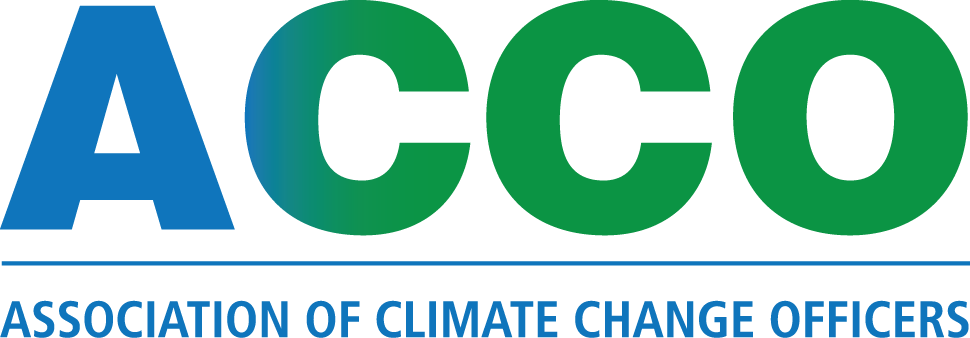ACCO at a Glance: Strategic Directions, Our Values & Key Initiatives
Climate change professionals play key roles in bringing about a critical transformation to operations and governance in the public and private sectors. ACCO, the premier community of practice and professional association for individuals addressing climate change in their occupations, is comprised of a rich and diverse blend of professionals encompassing a wide variety of sectors and professional functions.
Strategic Directions
- Establish ACCO as the standard bearer for climate preparedness professional development and training.
- Build an accredited network of institutions providing education and training activities.
- Develop tools, resources, templates and best practices to further advance the effectiveness of climate action.
- Advance the acceptance of the need for a climate change professional occupation, as well as the integration of climate change competencies into other critical professional functions.
- Represent the interests of climate change practitioners across sectors with respect to standards, best practices and public policy.
Our Values
- Commitment to professional mentoring;
- Responsiveness to the needs of our membership;
- Inclusiveness;
- Bringing harmonization to terminology, solutions and practices;
- Integrity guided by ethical standards; and
- Catalyzing a marketplace that requires climate related competencies to inform decision making and professional practice.
Key Initiatives & Programs
Credentialing
ACCO envisions the transformation of business practices to reduce global warming pollution; partnerships that revolutionize the resiliency of supply chains; and governmental engagement to achieve climate change mitigation and adaptation ensuring a world economy based on resiliency. In effort to achieve this transformation, ACCO is establishing a modular certification program that enables leaders to pursue tailored curriculum for their individual needs, organizational sectors and job functions. The Certified Climate Change Professional®,, or CC-P®, (formerly the Climate Governance Certificate) is designed for mid-level practitioners reflecting their dedication to professional development and competency in the fundamentals of climate change preparedness and strategic planning. Testing for this credential is open now, and additional credentialing programs are in development.
Future CCOs
This post-graduate fellowship program establishes a professional track for graduates pursuing opportunities in the profession of climate change leadership. Employers identify at least one long-term climate-centric project to which fellows are assigned and responsible for producing a case study at the conclusion of the fellowship. Employer partners have included The Coca-Cola Company, City of Las Vegas, Lockheed Martin, Greater Bridgeport Regional Council and WGL Holdings, and university partners are Duke University’s Nicholas School for the Environment, Arizona State University School for Sustainability, Bren School of Environmental Management at UC-Santa Barbara, and Yale School of Forestry & Environmental Studies.
Academies
The Climate Fundamentals Academies series are comprised of regional training workshops enabling attendees to complete all training in support of the Certified Climate Change Professional®, or CC-P®,credential (formerly the Climate Governance Certificate). These academies provide regionally tailored curriculum on topics including understanding climate science and variability, identifying climate hazards and conducting vulnerability assessments, basics of greenhouse gas accounting, the food-water-energy nexus, fundamental governance and stakeholder engagement strategies, enterprise risk management, engaging senior executives and public officials and examining the economic implications of climate change and related responses.

